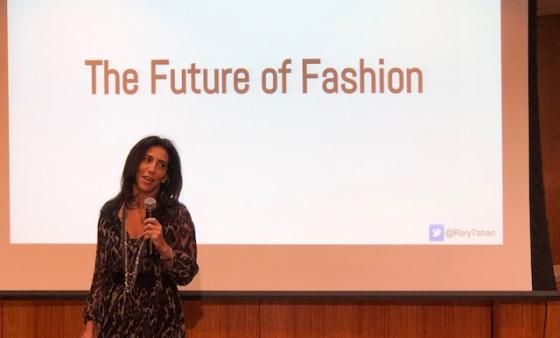
From posture-correcting leggings to vegan fabric, Cardozo’s Fashion Law Symposium on Feb. 26 explored the array of innovations and issues shaping fashion law today. The FAME Center and Fashion Law Society hosted the daylong event, coordinated by 2L Simone Dvoskin, which included speaker panels on topics such as Instagram influencers of fashion, artificial intelligence in e-commerce and much more.
“Is sustainable fashion only for people who can afford it?” Barbara Kolsun, FAME Center director and fashion industry attorney, asked the first panel of the day, which focused on the challenges of eco-friendly fashion practices.
“We want people to think of their clothing as investments,” said Amy Hall, Vice President of Social Consciousness at Eileen Fisher. Hall said the clothing brand buys back customers’ old garments at $5 each.
Cardozo alumnus Michael Neuman ’99 echoed this sentiment, saying fashion law is about “doing more with less.” As the head of the legal team at Marquee Brands, Neuman focuses on IP challenges such as the protecting the brand’s 18 clients from counterfeiting and increasing their brand-name recognition.
The innovations of IP law steered panel discussions, particularly surrounding wearable technology such as smart watches and baby ankle sensors. Preetha Chakrabarti, counsel for Crowell & Moring and member of the firm’s IP group, assists clients in applying for trademarks. Chakrabarti discussed how tech and fashion industries are starting to overlap and need the law to catch up. “All these worlds are coming together,” she said. “Hermes and Apple are coming together.”
A world-renowned fashion house itself took the podium as Rory Tahari, former president of luxury brand Elie Tahari, delivered the keynote address. With 20 years of experience, Tahari has seen the fashion world evolve. She even elicited a few gasps from the audience of about 200 attorneys, students and faculty when she presented a harsh reality of today’s industry: designers setting their own supply on fire.
“They’re burning their extra product in order to not dilute their brand value,” Tahari said.
She shared a vision for “the future of fashion,” which would demand that brands create a unique experience for consumers and that designers produce materials locally in a sustainable way.
Additional symposium panels included “The Influencers of Fashion: From Magazines to Instagram” and “The Retail Revolution: Utilizing Real Estate in the Digital Age of Shopping,” both of which echoed Tahari’s predictions for the modern fashion industry: “Consumers are more and more comfortable with living in a shared economy.”
Brands such as Eileen Fisher are already on this path. Hall said instead of disposing of their excess clothing, Eileen Fisher pieces that do not sell get cut up and turned into art. Hall said this is to encourage consumers to stop buying unnecessary clothing and producing more waste. Hall’s tip for the audience: “Just buy what you love.”
